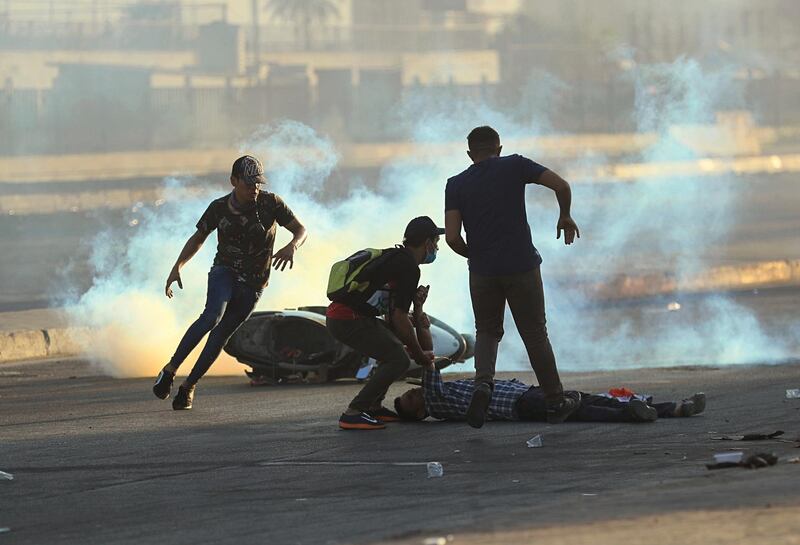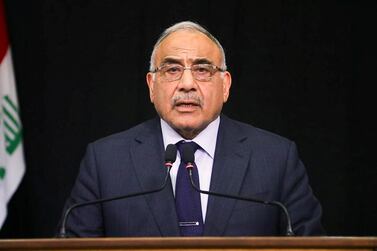Snipers from Iran-backed militias shot protesters during Iraq's anti-government demonstrations this month, security sources said.
“We have confirmed evidence that the snipers were elements of militias reporting directly to their commander instead of the chief commander of the armed forces,” an Iraqi security official told Reuters.
“They belong to a group that is very close to the Iranians.”
The revelation marks the first confirmation that the militias known as Hashed Al Shaabi took part in suppressing the protests that swept Baghdad and southern Iraq in the first week of October.
More than 100 people, mostly protesters, were killed and more than 6,000 were injured during the demonstrations against corruption, unemployment and lack of basic services.
Prime Minister Adel Abdul Mahdi’s government said it was investigating the violence and officials have said the military and police used excessive force in certain instances, but there was no mention of Iran-backed militias.
The two security sources said senior militia commanders decided to help put down the protests and asked Abu Zainab Al Lami, head of security for Hashed Al Shaabi, to direct the operation.
One of the sources, who attended daily government security briefings, said militiamen dressed in black shot protesters on the third day of unrest on October 3, when the death toll soared to more than 50 from about half a dozen.
The other source said the snipers were using radio communications equipment, provided by Iran, that is difficult to intercept, giving the groups a private network.
A group of senior commanders from Iran’s Islamic Revolutionary Guard Corps travelled to Iraq on the second day of the protests and met Iraqi intelligence and security officials, a regional diplomat said.
After the meeting, senior Revolutionary Guard officers with experience in curbing civil unrest continued to advise the Iraqi government, although no Iranian soldiers were used.
A commander of one of the Iran-backed militias, who claimed his group was not involved in trying to stop the protests, said Tehran consulted closely with forces trying to quell the demonstrations.
“After two days, they jumped in and supplied the government and militias with intelligence,” the militia leader told Reuters.
“Iranian advisers insisted on having a role and warned us that the ongoing protests, if not reversed, will undermine the government of Abdul Mahdi.”
An official with the prime minister’s office said that it would be “premature to lay the blame on any parties, whether from Hashed or other security forces, before we end the investigation.
"Let’s wait and see who gave the order ‘shoot to kill'.”
Mohammed Ridha, head of Parliament's security and defence committee, said on Thursday that an initial investigation showed there were "deliberate killings of protesters by some elements".
The protester deaths have put pressure on Mr Abdul Mahdi and his year-old government as the public and politicians demand an explanation for the high death toll.
He is already caught in the regional standoff between Iran and the US, both of which are allies of Iraq.
Interior Ministry spokesman Saad Maan said state security forces did not fire directly at protesters and blamed unnamed “vicious” shooters for the deaths and injuries.
The government opened an investigation to determine who shot the protesters and who ordered it, Mr Maan said on October 6.
It announced two more investigations on Saturday, a day after Iraq’s top Shiite cleric set a two-week deadline for the government to reveal its findings.
"The government is responsible when, under the eye of law enforcement, protesters are fired on illegally and media are beaten or attacked to terrorise their employees," Ayatollah Ali Al Sistani said in his Friday sermon.
One investigations is led by Iraq's military command and expected to shed light on the deaths and wounded, as well as attacks on public buildings and raids by unidentified gunmen on media.
The other, made up of representatives from the armed forces, Parliament, the human rights commission and the judiciary, will investigate and bring to justice soldiers who acted illegally.
Mr Abdul Mahdi's office said the establishment of the commission to investigate military personnel was "in response to Grand Ayatollah Sistani's sermon".
Meanwhile, a relative of a popular Iraqi blogger said the writer was detained on Thursday, apparently over his coverage of the anti-government protests.
THeavily armed masked gunmen stormed the apartment of Shujaa Al Khafaji in Baghdad at dawn and took him away, the relative told AP.
Mr Al Khafaji, 29, runs a Facebook page called Brothers Iraq, which focuses on human-rights breaches.







